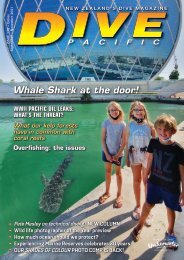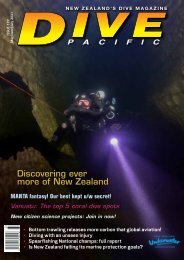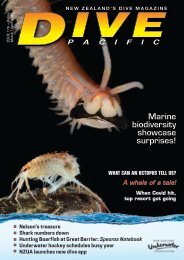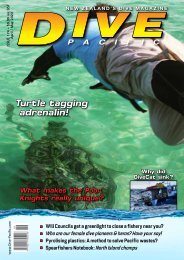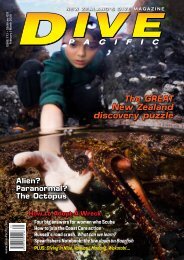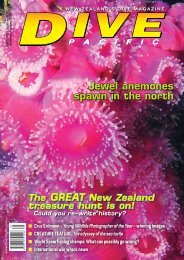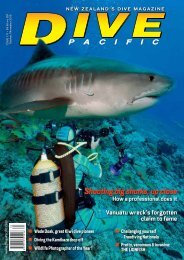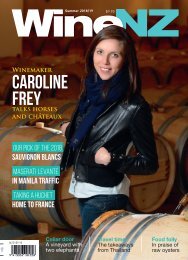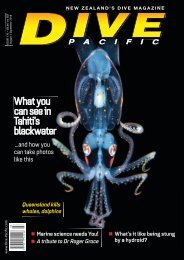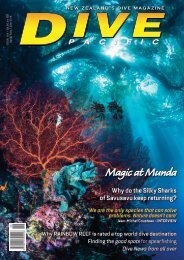Dive Pacific 175 Dec2020 Jan 2021
Dive Pacific, New Zealand's Dive Magazine , captures the best of diving in New Zealand and the Pacific. with adventures, top photos and expert technical advice
Dive Pacific, New Zealand's Dive Magazine , captures the best of diving in New Zealand and the Pacific. with adventures, top photos and expert technical advice
You also want an ePaper? Increase the reach of your titles
YUMPU automatically turns print PDFs into web optimized ePapers that Google loves.
Tiny animals and their<br />
critical importance on<br />
entire oceanic food webs<br />
By Jean-Michel Cousteau and Holly Lohuis<br />
Ocean Futures Society www.oceanfutures.org<br />
There is an inner galaxy of alien looking organisms on our own planet. Just night dive in open water<br />
with a bright light and witness for yourself the water column coming alive with all different forms of<br />
gelatinous plants and animals, referred to as plankton. It is indeed an unknown world to most of us,<br />
a world of wandering, drifting plants and animals, which provide the base of the very complex and<br />
extremely productive oceanic food web on which we all depend in so many important ways.<br />
The word plankton comes from<br />
the Greek, planktos, means to<br />
wander, or drift. These plants and<br />
animals make up a tremendous<br />
amount of the biomass in our oceans,<br />
yet the significance of how they<br />
influence key planetary functions is<br />
only being appreciated today as we<br />
are documenting major changes in<br />
our oceans.<br />
While many of these mysterious<br />
gelatinous organisms provide<br />
important opportunities to study the<br />
link between their abundance and<br />
the health of our oceans, there are<br />
many things we do know about their<br />
importance.<br />
…Every other breath we take is a gift from the sea…<br />
Phyto (plant) plankton<br />
Phytoplankton, plant plankton<br />
thrive in nutrient rich waters and<br />
are generally found in the sunlit<br />
waters of aquatic environments. Like<br />
terrestrial plants, phytoplankton<br />
contain chlorophyll and require<br />
sunlight in order to live and grow.<br />
Through the process of photosynthesis,<br />
phytoplankton take in CO 2<br />
and release oxygen. In fact, as much<br />
as 50% of our oxygen comes from<br />
phytoplankton. We can think of them<br />
as every other breath we take as a<br />
gift from the sea. They are one of the<br />
world’s most important producers of<br />
oxygen and they provide important<br />
food for the first order of consumers<br />
in the aquatic trophic food web,<br />
zooplankton.<br />
Plankton participate in the largest migration on the planet which<br />
happens under the cover of darkness every single night<br />
Zoo (animal) plankton<br />
Many zooplankton, or animal<br />
plankton, are grazers, filtering the<br />
planktonic soup of phytoplankton<br />
and other floating organic material.<br />
These animals participate in the<br />
largest migration on the planet which<br />
happens under the cover of darkness<br />
every single day. At night trillions of<br />
tiny plankton move from the deep<br />
scattered layer well over 300m deep<br />
towards the surface to feed. Come<br />
early morning hours, they then dive<br />
down to escape hungry mouths from<br />
above. So even though plankton<br />
are considered wanders, living a<br />
life adrift in the open ocean, they<br />
actually make an amazing vertical<br />
movement every single day.<br />
The richness of our seas is directly<br />
related to abundance and diversity<br />
of these drifting plants and animals.<br />
They not only provide the base of a<br />
rich web of life in the oceans, they<br />
are even preyed upon by the largest<br />
Inset Photo credit: Richard Murphy, PhD @Ocean Futures Society<br />
www.dive-pacific.com 17



